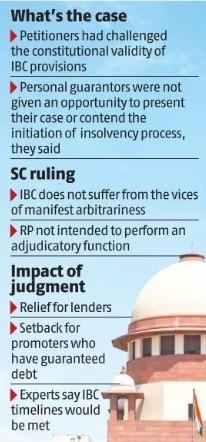Economy
Supreme Court Upholds Key Provisions of IBC
- 18 Nov 2023
- 6 min read
For Prelims: Supreme Court Upholds Key Provisions of IBC, Insolvency and Bankruptcy Code (IBC), Articles 21, Personal Guarantor.
For Mains: Supreme Court Upholds Key Provisions of IBC, Indian Economy and issues relating to planning, mobilization of resources, growth, development and employment.
Why in News?
Recently, the Supreme Court (SC) has upheld crucial provisions of the Insolvency and Bankruptcy Code (IBC) that were challenged on constitutional grounds.
- The Court addressed concerns regarding the violation of fundamental rights, including the right to equality, in insolvency proceedings.
What are the Concerns Raised by the Petitions and SC’s Observations?
- Petitioners Arguments:
- The main issue was that the personal guarantor was not given an opportunity to present their case or contend the initiation of the insolvency resolution process or have a say in the appointment of the RPs (Resolution Professionals).
- A personal guarantor is an individual who provides a personal guarantee for a loan or financial obligation undertaken by another party. When someone borrows money or obtains credit, a lender may require a personal guarantee as a form of security.
- The petitioner argued that the challenged parts of the Insolvency and Bankruptcy Code (IBC) didn't follow fair principles (natural justice) and affected fundamental rights like the right to livelihood, trade, and equality under the Constitution's Articles 21, 19(1)(g), and 14.
- The main issue was that the personal guarantor was not given an opportunity to present their case or contend the initiation of the insolvency resolution process or have a say in the appointment of the RPs (Resolution Professionals).
- Court’s Observation:
- Constitutionality and Personal Guarantors: The Court upheld the constitutionality of key provisions of the IBC, including allowing insolvency proceedings against personal guarantors.
- The court ruled that IBC is not retroactive and held that Sections 95 to 100 cannot be deemed unconstitutional simply because they do not give personal guarantors a chance to be heard before creditors’ insolvency petitions.
- It ruled against claims that these provisions lacked fairness or violated natural justice, stating that fairness should be assessed case by case.
- Constitutionality and Personal Guarantors: The Court upheld the constitutionality of key provisions of the IBC, including allowing insolvency proceedings against personal guarantors.
- Role of Resolution Professionals (RPs): The Court rejected the idea of involving judicial intervention before appointing RPs, stating that adding an adjudicatory role before a certain section would disrupt the IBC's set timelines.
- It clarified that RPs are facilitators who gather information and make recommendations, not decision-makers.
- Moratorium Provisions: The Court agreed that these provisions primarily protects debts rather than debtors.
- It supported the legislature's decisions on when the moratorium should apply and highlighted the differences between individual debtors, partnerships, and corporate debtors in the IBC.
What can be the Potential Impact of SC’s Judgement on IBC?
- Creditor Confidence:
- The affirmation of the IBC's provisions, particularly regarding personal guarantors, may boost creditor confidence.
- Creditors will feel more secure about initiating insolvency proceedings against guarantors, potentially leading to a more assertive approach in recovering debts.
- Clarity and Predictability:
- The clarity provided by the Court's ruling could enhance predictability within the insolvency framework. This could encourage smoother and more efficient resolution processes, reducing uncertainties that might have previously hindered creditor actions.
- Promoter Caution:
- The ruling might instill caution among promoters and individuals providing personal guarantees for corporate debts.
- Promoters, even of solvent companies, may become more circumspect about extending personal guarantees due to the potential risks highlighted by this judgement.
What is Insolvency & Bankruptcy Code, 2016?
- The Government implemented the IBC, 2016 to consolidate all laws related to insolvency and bankruptcy and to tackle Non-Performing Assets (NPA), a problem that has been pulling the Indian economy down for years.
- Insolvency is a situation where individuals or companies are unable to repay their outstanding debt.
- Bankruptcy, on the other hand, is a situation whereby a court of competent jurisdiction has declared a person or other entity insolvent, having passed appropriate orders to resolve it and protect the rights of the creditors. It is a legal declaration of one’s inability to pay off debts.
- The IBC Covers all individuals, companies, Limited Liability Partnerships (LLPs) and partnership firms.
- Adjudicating authority:
- National Company Law Tribunal (NCLT) for companies and LLPs.
- Debt Recovery Tribunal (DRT) for individuals and partnership firms.
- Adjudicating authority:
Legal Insights:
Read comprehensively about Important Institutions:
UPSC Civil Services Examination, Previous Year Question (PYQ)
Q. Which of the following statements best describes the term ‘Scheme for Sustainable Structuring of Stressed Assets (S4A)’, recently seen in the news? (2017)
(a) It is a procedure for considering ecological costs of developmental schemes formulated by the Government.
(b) It is a scheme of RBI for reworking the financial structure of big corporate entities facing genuine difficulties.
(c) It is a disinvestment plan of the Government regarding Central Public Sector Undertakings.
(d) It is an important provision in ‘The Insolvency and Bankruptcy Code’ recently implemented by the Government.
Ans: (b)







